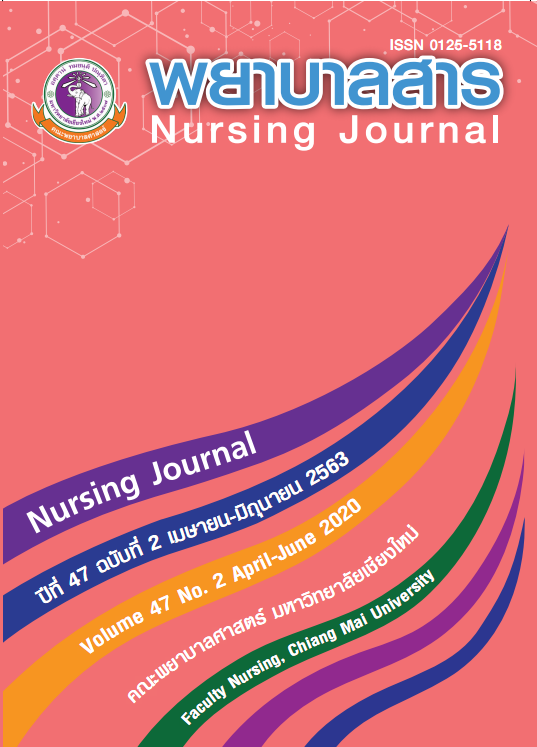Effectiveness of Implementing Cognitive Behavior Therapy Program Among Patients with Alcohol Dependence, Thanyarak Maehongson Hospital
Keywords:
Cognitive Behavior Therapy Program, Patients with alcohol dependence, Drinking behaviorsAbstract
Alcohol dependence impacts physical and psychological health among patients with alcohol dependency and also impacts their families and society. So they need to be treated with proper therapy. Cognitive behavior therapy is a psychosocial therapy that could reduce drinking behavior. The purpose of this operational study was to study the effectiveness of implementing a cognitive behavior therapy program among patients with alcohol dependence at Thanyarak Maehongson Hospital (TMH). The sample included 15 patients with alcohol dependence who were admitted at the detoxification unit of TMH from June to August 2017, and six nurses who conducted the program. The study instruments consist of 1) the Demographic Data Form, 2) the Alcohol Use Disorders Identification Test (AUDIT), 3) the Satisfaction Questionnaire Of The Program Users modified from the nurse’s opinion survey form according to patients discharge planning, 4) the Satisfaction Questionnaire Of Patients with Alcohol Dependence modified from the satisfaction questionnaire of patients were assisted by a counseling program, 5) the Cognitive Behavior Therapy Program (CBTP) 6) the Clinical Institute Withdrawal Assessment for Alcohol-Revised (CIWA-Ar). Data were analyzed using descriptive statistics.
The results of study
- After receiving CBTP, the patients were assessed at one month after discharge from the hospital. All of the patients with alcohol dependence were able to reduce their drinking behaviors and 66.67 % of them completely stopped drinking.
- All patients with alcohol dependence who received the program expressed that this program was beneficial for them to reduce, quit or stop drinking and were overall satisfied with the program from high to the highest level.
- One hundred percent of the nursing personnel who conducted the program have a high level of perception that the program is beneficial to their practice, their patients and their patients’ relatives. More than eighty percent (83.33%) of them expressed that the program was appropriate for practice in the organization and have a high level of overall satisfaction of the program.
The results of the study indicates that CBTP can decrease the drinking behavior of patients with alcohol dependence by receiving services at the detoxification unit of Thanyarak Maehongson Hospital. Therefore, this program should be further implemented for patients with alcohol dependence.
References
Beck, A. T., Wright, F. D., Newman, C. F., & Liese, B. S. (1993). Cognitive Therapy of Substance Abuse. New York: The Guilford Press.
Center for Alcohol Studies, Thailand. (2013). The situation of alcohol consumption and domestic impact in 2013. Bangkok: Graphico System Company. (In Thai)
Chainoon, C. (2008). Effect of cognitive behavior therapy on alcohol drinking behaviors among persons with alcohol dependence Somdejphrachaotaksinmaharaj Hos pital, Tak Province (Independent Study, Chiangmai University). (In Thai)
Duansawang, A. (2008). Effectiveness of using discharge plan for suicidal attempted patientsadmitted to Sobprabab Hopital, Lampang Province (Independent Study, Chiangmai University). (In Thai)
Kittirattanapaiboon, P., Kongsuk, T., Pengjuntr, W., Leejongper mpoon, J., Chutha, W., Kenbubpha, K. (2013). Epidemiology of psychiatric comorbidity in Thailand : a national study 2008. Journal of Mental Health of Thailand, 21 (1), 1-14. (In Thai)
Lambert, M. J., & Barley, D. E. (2001). Research summary on the therapeutic relationship and psychotherapy outcome. Psychotherapy, 38 (4), 357-361.
Matthew, G. A. (1997). Cognitive-behaviour therapy and problem drinking: A meta-analysis(Master’s thesis, University of Toronto).
National Statistical Office, Thailand (2011). Summary of smoking and alcohol drinking behavior surveys of Thai population 2011. Retrieved from https://www.society.go.th/ewtnews. ph p?nid=13207
Panya, P., Sethabouppha, H., & Jormsi, P. (2013). Experiences of Relapse among Elderly with Alcohol Dependence. Nursing Journal of Thailand, 40 (4), 45-55. (In Thai)
Pearson, A., Wiechula, R., Court, A., & Lockwood, C. (2005). Th e JBI model of evidence-based
healthcare. International Journal of Evidence-Based Healthcare, 3 (8), 207 - 215.
Peschken, W., & Johnson, M. (1997). Therapist and client trust in the therapeutic relationship. Psychotherapy Research, 7(4), 439-447.
Pruekkanon, B., Sirisamut, T., Duangthipsirikun, S., Puangladda, S., & Sudsriwilai, K. (2013).Epidemiology mental health problems and psychiatry. Bangkok: Office of the Secretariat to the National Mental Health Commission, Department of Mental Health. (In Thai)
Rogers, E. M. (1983). Diffusion of innovations (3nd ed.). New York: The Free Press.
Saipanish, R., & Silpakit, C. (2015). Substance use disorders. Bangkok: Department of Psychiatry, Faculty of Medicine, Ramathibodi Hospital, Mahidol University. (In Thai)
Downloads
Published
How to Cite
Issue
Section
License
บทความที่ได้รับการตีพิมพ์เป็นลิขสิทธิ์ของวารสารพยาบาลสาร
ข้อความที่ปรากฏในบทความแต่ละเรื่องในวารสารวิชาการเล่มนี้เป็นความคิดเห็นส่วนตัวของผู้เขียนแต่ละท่านไม่เกี่ยวข้องกับมหาวิทยาลัยเชียงใหม่ และคณาจารย์ท่านอื่นๆในมหาวิทยาลัยฯ แต่อย่างใด ความรับผิดชอบองค์ประกอบทั้งหมดของบทความแต่ละเรื่องเป็นของผู้เขียนแต่ละท่าน หากมีความผิดพลาดใด ๆ ผู้เขียนแต่ละท่านจะรับผิดชอบบทความของตนเองแต่ผู้เดียว






